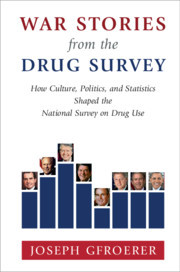Description
War Stories from the Drug Survey
How Culture, Politics, and Statistics Shaped the National Survey on Drug Use and Health
Author: Gfroerer Joseph
An insider account that encapsulates thirty years of experience in conducting data science in a political context.
Language: English
Approximative price 135.14 €
In Print (Delivery period: 14 days).
Add to cart
Publication date: 12-2018
276 p. · 15.6x23.5 cm · Hardback
276 p. · 15.6x23.5 cm · Hardback
Description
/li>Contents
/li>Biography
/li>
The primary data driver behind US drug policy is the National Survey on Drug Use and Health. This insider history traces the evolution of the survey and how the survey has interacted with the political and social climate of the country, from its origins during the Vietnam War to its role in the war on drugs. The book includes first-hand accounts that explain how the data was used and misused by political leaders, why changes were made in the survey design, and what challenges researchers faced in communicating statistical principles to policymakers and leaders. It also makes recommendations for managing survey data collection and reporting in the context of political pressures and technological advances. Survey research students and practitioners will learn practical lessons about questionnaire design, mode effects, sampling, nonresponse, weighting, editing, imputation, statistical significance, and confidentiality. The book also includes common-language explanations of key terms and processes to help data users understand the point of view of survey statisticians.
Introduction; 1. President Nixon launches the war on drugs; 2. The survey continues, as illicit drug use peaks; 3. Cocaine and new directions for the survey; 4. The White House needs data and a bigger survey; 5. Criticism, correction, and communication; 6. The survey moves to SAMHSA; 7. Rising drug use in the 1990s; 8. Better sample, better analysis, but not always; 9. A perfect redesign storm; 10. Continuing survey design improvements; 11. Analytic bankruptcy, reorganization, recovery, and resilience; 12. How to redesign an ongoing survey, or not; 13. Lessons learned and future challenges.
Joseph Gfroerer was responsible for analysis and supervision of the National Survey on Drug Use and Health for more than three decades as a statistician at the National Institute on Drug Abuse (NIDA) and the Substance Abuse and Mental Health Services Administration (SAMHSA). A widely recognized expert in methods for substance use surveys, he authored dozens of peer-reviewed journal articles and book chapters, and hundreds of government reports on survey methodology and substance use epidemiology. A member of the American Statistical Association for over thrity-five years, he has received numerous awards from NIDA, SAMHSA, the White House, and the American Public Health Association for his work on the survey.
© 2024 LAVOISIER S.A.S.




